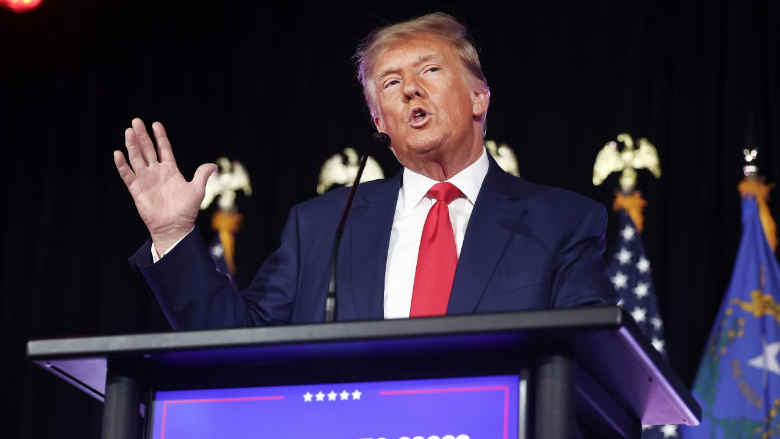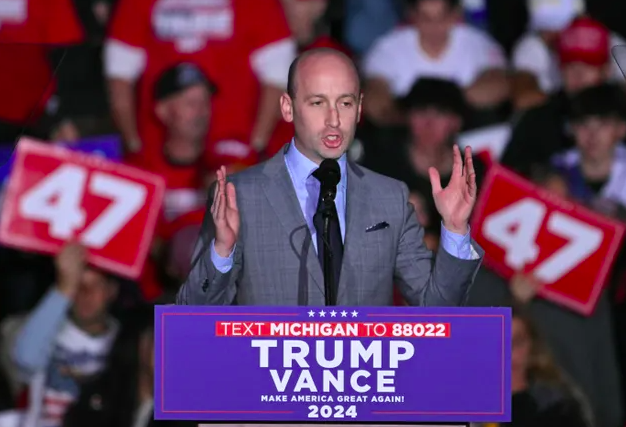A massive “Vote for Trump” sign lit up the skies of Amsterdam, New York, Monday night after a court ruling allowed its display. The 100-foot sign, perched atop a Sticker Mule facility, drew a crowd of locals excited to witness the event. This spectacle came after Montgomery County Supreme Court Justice Rebecca Slezak lifted a restraining order earlier that day, granting permission for the sign’s illumination.
The case surrounding the sign began in August when Sticker Mule CEO Anthony Constantino proposed the idea of displaying the sign at the company’s headquarters. City officials, including Amsterdam’s Democratic Mayor Michael Cinquanti, voiced concerns about potential traffic disruptions and safety hazards. However, Judge Slezak’s ruling allowed the sign to stay, sparking celebration among Trump supporters and controversy among local Democrats.
Sticker Mule, known for its custom stickers and promotional products, faced pushback after attempting to bypass the proper city channels for approval. The company had been instructed by the city to obtain a permit and zoning variances before moving forward, but they reportedly did not comply.
The city’s legal team, led by Mayor Cinquanti, filed a lawsuit in response, arguing that the sign posed a distraction that could endanger traffic flow and lead to accidents, especially with drivers stopping to take pictures. The lawsuit cited potential risks of injury to drivers and passengers, adding to the city’s safety concerns.
Despite these claims, Judge Slezak ruled that the sign’s placement was far enough from major roads to not pose any significant danger. While it is visible from the New York State Thruway, she determined that the distance mitigated the risks the city’s legal team had presented. Additionally, the judge noted that the lawsuit contained clerical errors and gave the plaintiffs until October 18 to refile their case if they wished to pursue it further.
For Sticker Mule CEO Anthony Constantino, the ruling was a victory not only for his company but for free speech. Constantino, who also leads a political action committee supporting former President Donald Trump, celebrated the decision as a win for the First Amendment. “Democrats want to get rid of free speech and censor America, and so the sign now signifies something even bigger than what I thought,” he said. He emphasized that the sign, while promoting Trump, was also an “uplifting thing” for community morale, regardless of political affiliation.
The legal debate over the sign underscores broader tensions in the lead-up to the 2024 presidential election. Political signage has long been a point of contention in local communities, with debates often focusing on the balance between free speech and public safety. For Constantino and his supporters, the sign represents a stand against what they view as increasing attempts to stifle conservative voices.
Sal Ferlazzo, Constantino’s lawyer, expressed satisfaction with the judge’s ruling. “All I know is tonight the party is on, and the lighting will occur,” he said. “There is no court order prohibiting the lighting and display of the sign, so it’s obviously a nice victory for Anthony and his team.” Ferlazzo’s comments reflect the celebratory atmosphere surrounding the sign’s unveiling, as supporters gathered to witness the towering display light up the evening sky.
While the judge’s ruling allows the sign to stay for now, the case is far from over. Local officials may refile their case in hopes of getting the sign removed or subject to further regulation. For the time being, though, the 100-foot sign remains a prominent feature of Amsterdam’s skyline, visible from miles away, including from the heavily trafficked New York State Thruway.
This latest incident adds to the ongoing debate over political speech in public spaces, particularly when large-scale signage is involved. Amsterdam, a city of about 18,000 residents located 35 miles northwest of Albany, has become the unlikely epicenter of this legal battle.
The ruling is likely to resonate beyond the local level, serving as a precedent for similar cases across the country as communities grapple with how to handle politically charged displays in the public sphere.
Constantino and his supporters argue that the sign is an expression of free speech, protected under the First Amendment, while critics maintain that its size and prominence could create hazards for motorists. The outcome of any future legal challenges could shape the boundaries of permissible political expression, especially in the context of large, public-facing displays like the “Vote for Trump” sign.
For now, the illuminated sign remains a fixture in Amsterdam, drawing attention from locals and travelers alike. Whether it becomes a lasting symbol or a temporary flashpoint in the political landscape remains to be seen. As the 2024 election draws closer, the sign and the court case surrounding it will likely continue to generate conversation, both in Upstate New York and beyond.



